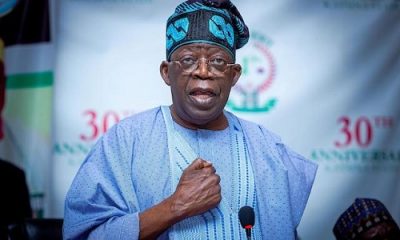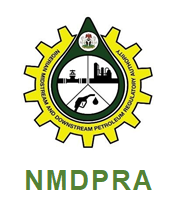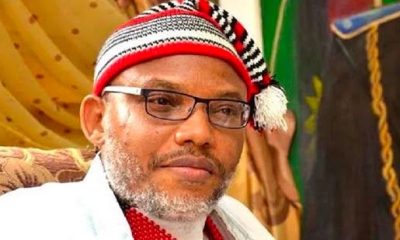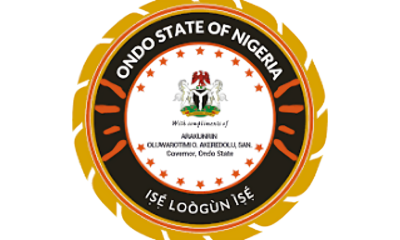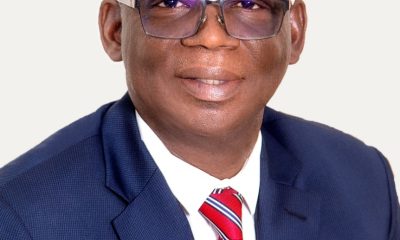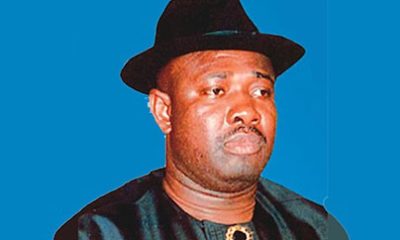COVER
FG Owes NNPC N2.8trn over Subsidy – Kyari

By Mathew Dadiya, Abuja
The Nigerian National Petroleum Company Limited (NNPCL) Group Chief Executive Officer, Mele Kyari yesterday disclosed that the Federal Government owed the Company N28 trillion which it has used to pay for the subsidy from their cashflow.
Kyari said that NNPC wouldn’t be able to continue to pay for the subsidy since the Federal Government has not offset what they have used to pay hence the need to end the subsidy regime.
The NNPC Ltd GCEO, who spoke alongside with the Nigerian Mainstream and Downstream Petroleum Regulatory Authority (NMDPRA), Authority Chief Executive Farouk Ahmed with State House correspondents after a closed doors meeting with President Bola Tinubu at his first assumption of office at the Aso Rock, said the 2023 budget made provision for the subsidy till end of June 2023.
“So today the country don’t have the money to pay for subsidy. There’s incremental value that will come from it. But it is not an issue of whether you can do it or not because today we can’t afford it and they are not able to pay our bill. That comes to how much is the federation owing NNPC now.
“Today, we are waiting for them to settle up to N2.8tn of NNPC’s cashflow from the subsidy regime and we can’t continue to build this,” he revealed.
“Since the provision of the N6tn in 2022, and N3.7tn in 2023, we have not have not received any payment whatsoever from the Federation.
“That means they (Federal Government) are unable to pay and we’ve continued to support this subsidy from the cash flow of the NNPC. That is, when we net off our fiscal obligations of taxes and royalty, there’s still a balance that we’re funding from our cashflow. And that has become very, very difficult and affecting our other operations.
“We’re not able to keep some of these cash for invest on our core businesses.
The end result is that it can be a huge challenge for the company and we have highlighted this severally to government that they must compensate and NNPC they must pay back an NNPC for the money that we have spent on the subsidy,” he said.
Also speaking, Authority Chief Executive NMDPRA, Farouk Ahmed said that his office being the regulatory agency has been synergizing with the Federal Competition and Consumer Protection Commission (FCCPC) to make sure oil marketers did not explore the consumers.
Ahmed said there was no operational basis or sufficiently diminished/acute reduction in product availability at both supply and retail points in the value chain to justify the hardship and constraints otherwise emerging.
The Authority on May 29, 2023, advised consumers not to engage in panic purchases or otherwise stockpiling products in a manner inconsistent with regular periodic purchases and consumption.
Company Silent on Take-Off Date for Subsidy Removal
The Nigerian National Petroleum Corporation (NNPC) Limited, has refused to elaborate on the take-off date for the removal of petrol subsidy announced by President Bola Tinubu on Monday.
NNPC Group Chief Executive Officer, Mele Kyari, who spoke with State House correspondents on the need to remove petrol subsidy yesterday after meeting with President Bola Tinubu, however failed to name the take-off date for the exercise.
Kyari blamed panic-buying for the queues that surfaced in parts of the country after the president’s inaugural speech on Monday.
“All of us must have seen the importance of what exactly this means. And typically consumers will rush to the fuel station to fill their tanks. And that is why you’re seeing these queues,” he said.
“And also for marketers, they would like to see what exactly this means in the sense that… ‘so how are we going to sell the product if subsidy on PMS is removed’ — and the combination of the two is what you are seeing; the obvious dislocation of distribution.
“And we believe that this will go away very, very quickly…”
Kyari said the continued payment of petrol subsidy creates a situation whereby the NNPC is not “able to invest in our core businesses”.
“And at the end result is that it can be a huge challenge for the company. And we have highlighted this severally to government that they must compensate NNPC, they must pay back NNPC for the money that we have spent on the subsidy,” he added.
“Fortunately, also by virtue of the provisions of the law and also the Appropriation Act 2023, it is no longer available for that funding and we are very convinced today that the country can no longer fund this subsidy bill and they will not be able to pay NNPC.”
Kyari said the NNPC is happy with the president’s “commitment to the elimination of this subsidy because they can’t afford it anymore”.
Tinubu, Shettima Meet Aso Rock Officials, Others
In line with his earlier avowed commitment to hit the ground running immediately after inauguration, President Bola Tinubu, yesterday assumed duty in his office at the Aso Rock Presidential Villa Abuja.
The president’s convoy arrived the front arcade of the Villa office at about 2:30 p.m. where he received a special military salute at the diplomatic gate.
Tinubu was received by the Vice President, Kashim Shettima, who had earlier assumed duty, and the Speaker of the House of Representatives, Femi Gbajabiamila.
Also present to receive the President were the Governor of the Central Bank of Nigeria (CBN), Godwin Emefiele; the Group Managing Director of the NNPCL, Mele Kyari, and Executive Secretary of Nigeria Midstream and Downstream petroleum Regulatory Authority, Farouk Ahmed, among others.
Tinubu, a former governor of Lagos State, immediately went into a meeting with his officials.
The president and Mr Shettima were sworn-in on Monday in Abuja. They took over from former President Muhammadu Buhari and former Vice President Yemi Osinbajo.
Similarly, Vice President, Senator Kashim Shettima, also resumed work yesterday at the Presidential Villa, interacting with the Permanent Secretary, State House, Mr Tijanni Umar, some management staff of the Office of the Vice President and State House Correspondents.
The Vice President was accompanied to the Office by his personal aides where he met with the Permanent Secretary and senior civil servants in the Office of Vice President.
Speaking to State House Correspondents inside his office, the Shettima talked about expectations in the coming days, noting that “power to me is a humbling experience, it is all about how we can make life better for the common man.”
“I want to assure our countrymen that President Bola Tinubu will by the grace of God catapult this nation to a higher pedestal. He is determined, he has the skills set, the temperament, the disposition and the purity of mind and commitment to give service to this nation,” he added.
The Vice President further stressed that “the President and Commander-in-Chief of the Armed Forces of the Federal Republic of Nigeria is poised to redefine the meaning and concept of modern governance,” assuring Nigerians that “he (President Tinubu) is going to provide the leadership and we will rally round him. Give him our unequivocal support and loyalty to see to the realization of the Nigerian dream.”
He also reassured that “our President is a man of strong will and in the fullness of time we will appreciate his humble intentions for this country. The issue of fuel subsidy will be frontally addressed, the earlier we do so, the better. The issue of multiple exchange rates, we need to collapse them into one.”
“These are two big elephants in the room, and in the days and weeks to come, the President is going to unveil his agenda.
As I have always said, there can never be two captains on a ship, he is the President and Commander-in-Chief of the Armed Forces, I am his VP, my relevance is directly proportional to my level of loyalty to my principal.
Speaking on his relationship with President Tinubu, he said “this is a gentleman that I have known for over a decade and I have closely interacted with, be rest assured that we are going to work harmoniously as a team, as a family for the greater good of our nation,” the VP added.
Shettima was sworn-in on Monday, May 29, as Nigeria’s number two citizen at a historic ceremony attended by leaders across Africa and beyond, marking the beginning of a new journey tagged “renewed hope”.
COVER
Afreximbank Net Interest Income Grows 4.53% to $ 411.2m in Q1

By Tony Obiechina, Abuja
African Export-Import Bank (Afreximbank) has released the consolidated financial statements of the Bank and its subsidiaries for the three months ended 31 March 2025.Financial HighlightsAfreximbank Group delivered satisfactory financial performance for the first quarter of 2025, meeting expectations with solid profitability, strengthened liquidity and a resilient capital base.
This performance provides a springboard for the Bank to continue playing its pivotal role of advancing the aspirations of Africa and the Caribbean for economic transformation and sustainable development in the months and years ahead. Net interest income grew by 4.53% to $411.2 million compared to prior year, driven by growth in interest earning assets, complemented by effective management of borrowing costs, helping the Bank to cushion the marginal decline in total interest income due to softening benchmark rates.Fee income from Guarantees and Letters of Credit saw robust growth of 47% and 36% respectively, partially offsetting lower advisory fees to contribute to total unfunded income of $26.9 million for Q1-2025. While this represented a 7.41% decrease from $29.0 million in Q1 2024, the strong performance in Off-balance sheet assets is in line with the Bank’s strategy to grow unfunded business.The Group posted strong Net Income of $215 million, a 21% increase year-on-year from $178 million in the prior period.The Group’s total assets and contingent liabilities increased by 6.4%, reaching $42.7 billion as of 31 March 2025, up from $40.1 billion at FY’2024. On-balance sheet assets grew by 4.85% to $37.0 billion; driven primarily by a 58% surge in cash balances to $7.4 billion, while Off-balance sheet assets i.e. letters of credit and guarantee volumes increased by a 19% to reach $5.7 billion at the end of Q1-2025.Net loans and advances closed Q1-2025 at $27.8 billion; down from the FY2024 closing position reflecting early repayments from certain customers on account of improved foreign currency balances position of some sovereign borrowers. Importantly, the Loan Asset Quality remained strong, with the Non-Performing Loans (NPL) ratio at 2.44%, a modest increase from 2.33% at FY’2024 – well below the Bank’s strategic NPL ceiling of 4%.Driven by inflationary pressures and growing personnel costs, operating expenses rose by 23% to reach $75.4 million by 31 March 2025. Despite this, Afreximbank Group maintained a healthy Cost-to-Income Ratio of 16%, below its strategic range of 17-30%.Afreximbank’s liquidity profile strengthened considerably, with liquid assets now comprising 20% of total assets, up from 13% at the close of FY’2024. This higher liquidity position was as a result of successful fund-raising, coupled with loan repayments received during the quarter.Shareholders’ funds increased by 3.4%, reaching $7.5 billion, driven by strong internally generated capital of $215.4 million in addition to new equity investments under the second General Capital Increase (GCI II) programme.Operating HighlightsIn line with the Afreximbank strategic objective of driving Industrialisation and export development, the Bank and the Government of Kenya ratified a number of initiatives designed to support the development Industrial Parks (IPs) and Special Economic Zones (SEZs) in Kenya under the US$3 billion Kenya country programme.The projects which include Dongo Kundu Industrial Park in Mombasa and Naivasha SEZ II in Mai Mahiu, are key components of Kenya’s Vision 2030 plan to boost export manufacturing and industrialisation. Afreximbank’s support for these initiatives will specifically enhance infrastructure development, attract investment, and strategically position Kenya as a key hub for African and global commerce.The rollout of the Pan-African Payments and Settlement System (PAPSS) continues to gain momentum with KCB Group in Kenya and Bank of Kigali in Rwanda launching the platform, becoming the first banks in their respective countries to offer seamless, instant, and affordable cross-border payments in local currencies across Africa.Aligned with its mandate to promote Global Africa following the recognition of the African Diaspora as the 6th region of Africa, the Bank further cemented its expansion and presence in the Caribbean with the historic groundbreaking ceremony to kick off the construction of the first ever Afreximbank African Trade Centre (AATC) outside of Africa in Bridgetown, Barbados. AATC Barbados will also host its regional office. The Barbados AATC is an authentic icon of trade embodying the ambition, resilience, and influence of leading commercial cities in Africa and the Caribbean that serve as dynamic focal points for commerce, fostering regional and global trade connections, and is expected to enhance intra-and extra-African trade, with a focus on countries of the Global South.Denys Denya, Afreximbank’s Senior Executive Vice President, commented:“Our QI 2025 results, which were in line with expectations, reflected a strong and resilient financial performance, notwithstanding continued macroeconomic challenges. With solid profitability growth, a strengthened liquidity position, and a well-capitalised balance sheet, the Group is firmly positioned to continue playing a pivotal role in advancing the aspirations of Africa and the Caribbean for economic transformation and sustainable development.”COVER
Wike Presents N1.7trn 2025 Budget to NASS

By Laide Akinboade, Abuja
The Minister for Federal Capital Territory (FCT), Nyesom Wike, on Wednesday presented N1.7 trillion as the total FCT 2025 statutory budget to the National Assembly.The FCT Minister presented the budget on behalf of President Bola Tinubu to the House committee on FCT in Abuja.
He said the sum of 1,289,690,124,776 Naira is for capital projects, which constitutes 72. 33% of the budget. He said FCT Administration is indeed grateful for the understanding and magnanimity of the Honourable Committee in considering the FCT 2025 Statutory BudgetHe reminded the committee that FCT Statutory Budget is funded from proceeds of the 1% of the 52.68% Statutory Allocation of the Federal Government from the Federation Account, InternallyGenerated Revenue (GR) and the other sources as contained in the Revenue Fiscal Framework.He noted that the 2025 budget is accordingly prepared within the context of the Medium-Term Expenditure Framework (MTEF), the Medium-Term Development Plan (MTDP) and the International Public Sector Accounting Standards (IPSAS). The Budget also took into consideration the Federal Government’s assumptions for 2025.The Budget proposal also has taken into cognizance the estimated revenue accruing to the FCT through the Federation Account and recognizes other in-house efforts to bo0st revenue generation capabilities in FCT. The focus of the capital budget is mainly on completion of on-going projects that have a high impact on service delivery.He said, “Accordingly, a fiscal framework of the sum of N1,783,823,708,392.00 comprising Distributable Revenue of N1,392,573,937,087.00 and Non-Distributable Revenue of N391,249,771,305.00 has been proposed for the FCT 2025 Statutory Budget after due deliberations with all the Revenue Generating Agencies of the FCTA, taking into consideration the parameters highlighted in paragraph 5 above.”When compared 2025 Budget proposal of the sum of N1,783,823,708,392.00 with the Revised 2024 Appropriation of the sum of N1,668,770,61 0,283.00, there is an increase of the sum of N115,053, 098,108.76 (7%) in the 2025 statutory budget proposal.This increase is to achieve a realistic budget performance in 2025 having considered the remarkable improvement in the revenue generated in 2024 fiscal year”.The chairman of the House of Representatives’ Committee on the Federal Capital Territory (FCT) Hon. Aliyu Betara earlier commended the FCT Minister for tackling the current waves of insecurity in FCT, being able to deliver its mandate effectively.He said, “We have noted with satisfaction the completion of various projects and new ones embarked by the FCT administration. Out of the total FCT 2025 statutory budget of 1,783,823,708,392 Naira, the sum of 1,289,690,124,776 Naira is for capital projects, which constitutes 72.33% of the budget.”It is important to note that out of the total capital proposal of the sum of 1,889,014,910,776 Naira is for ongoing projects, and this constitutes 85% of the capital project. In effect, what I’m saying is, out of the total amount earmarked for capital for 2025, the FCT is using or utilizing or proposing to use 85% of that amount for completion of ongoing projects. The sum of 200,775,212,000 is just for new projects”.The Minister had earlier presented the same 2025 budget to the Senate Committee on FCT.The Chairman of the Senate Committee on the Federal Capital Territory (FCT) is Senator Ibrahim Bomai, who said FCT is presenting one of the best budgets so far.”And before I allow the floor for questions, I would also like to note that the IGR proposed by FCT has greatly improved. The FCT is proposing 608 billion just IGR.”So this is something to commend the Honorable Minister of State and his staff for doing a wonderful job”, he said.COVER
LP Crisis: NWC Accuses Ajero-led NLC of Destabilization

By Mike Odiakose, Abuja
The leadership of the Labour Party yesterday alleged that Nigeria Labour Congress (NLC), led by Joe Ajero, is responsible for the crisis rocking the party and not the Federal government.In his reaction to the allegation by Ajero, Nenadi Usman and others said that the Labour Party is being destabilized by the federal government because of the potential of the party, the party’s Spokesman; Obiora Ifoh said they are economical with the truth.
“The NLC President, Ajero who is now sounding like a broken record, also restated his resolve to invade unannounced the national and state Secretariats of the Labour Party, with his armies, with the intention to take over the party forcefully.”We must state clearly and categorically that if there is any person or organization that has destabilized the Labour Party or who is working to destabilize the party, it is no other person than Joe Ajero and the NLC.”We must also state here that after the general election in 2023, the party has no issues at all, we had no faction and we had no major disagreement in the party.”It was Ajero who went ahead to illegally, unprofessionally and unconstitutionally set up a so-called Transition Committee which went all over the place making noise and debasing the image of the party.”It was the same Committee set up by Ajero that was going to INEC everyday, constituting nuisance, all in attempt to destabilize the party, mobilizing people, including old and retired men, including Abdulawaheed Omar, Ejiofor, Lawson Osagie and Prof. Theophilus Ndubaku, men who should be resting after many years of serving their fatherland, to go against the interest of the party.”Nigerians all over, have asked Ajero to concentrate on his primary assignment to fight for the welfare of workers. The regulatory body in charge of the Labour Union in the Ministry of Labour has also publicly admonished Ajero to excuse himself from matters concerning politics and to face his legitimate assignment as a defender of workers rights.”We put it on record that Ajero’s led NLC in all its ramifications has failed the Nigerian workers as shown by his last May Day speech. Today, Nigeria workers are oppressed, the economy is not working, there are unfair practices against workers, and nobody speaks for the oppressed workers in Nigeria, yet Ajero is busy plotting his future political ambition and toiling with the welfare of workers.”Over the past few years, instead of the NLC to be in support of the party, and for the party to draw strength from the Labour movement as it’s done in some Scandinavian countries such as in Brazil, Australia etc, what we found in Nigeria is a reversed approach were the NLC which ought to be a source of strength, is constituting itself as a destabilizing factor for the Labour Party.”Since 2015, this same NLC was the one that set up the Caretaker Committee that is unknown to the party constitution headed by one Salisu Mohammed. If there is any group or persons who have worked against the interest of the Labour Party, it is NLC and Joe Ajero.”So he should not shift the blame to any person, he should squarely take responsibility for whatever is happening in the party today.”We are also calling on all genuine members of the Labour Party to distance themself from the illegal activities of the Nenadi Usman group and their ploy to manipulate unsuspecting party members from parting with their hard earned money through illegal Congresses they are planning.”They do not have the powers to conduct any party activity, congresses inclusive. Be warned.”Labour Party open to all Nigerians but not for sale — NLC President
Nigeria Labour Congress (NLC) has declared the Labour Party open to defectors, pledging to provide equal political opportunities for all Nigerians regardless of social status, religion, or ethnicity.The Congress added that the party is open to all Nigerians and willing to welcome defectors.NLC President, Joe Ajaero who spoke in Abuja during the National Executive Council (NEC) meeting of the Labour Party held yesterday alleged that government agencies were actively working to destabilise the party through various clandestine plots.“All agencies of government are involved in these destabilisation plots. We must be clear about this.“They must be told to remove their hands from the organisation of the Workers’ Party. That is a sin. Across over 57 countries of the world, Labour Parties are functional and driven by workers’ unions,” Ajaero warned.He cited the British Trades Union Congress (TUC), which has for decades operated the Labour Party using a union office, as an example of global practice.“So why should Nigeria be different? Why would the government keep eyes on the Labour Party here?” He queried.Ajaero reaffirmed that the Labour Party is not the exclusive preserve of the NLC but a party “formed by Congress and given to Nigerians with a clear-cut ideology.”He emphasised the platform’s openness and commitment to inclusivity.He also criticised attempts to use the Supreme Court to interfere in internal party affairs, asserting that the apex court has already ruled that internal crises should be resolved through mechanisms within the party.“When people talk about Supreme Court rulings, I wonder if the Supreme Court is now the one to run political parties. It is not the Supreme Court that constitutes the Labour Party,” he insisted.Taking a swipe at other political parties that charge exorbitant fees for expression of interest and nomination forms, Ajaero contrasted them with the Labour Party, which he said is rooted in pro-people values.In the Labour Party, we don’t charge hundreds of millions to contest elections because we can’t afford it. We are in politics to add value to society, to bring relief to the oppressed—not to profit from the people’s misery,” he said.Encouraging defectors from other political parties to join, Ajaero stressed the enduring institutional nature of the Labour Party.“This is our party. We do not defect. NLC and TUC are institutional members. When politicians defect, we remain. Soldiers come, soldiers go, but the barracks remain.”He called on all stakeholders to unite and work collectively towards strengthening the party and achieving its goals.Earlier, the Chair of the Board of Trustees of the party, Dr Sylvester Ejiofor, lamented that previous efforts to resolve internal crises had failed because they lacked alignment with the party’s constitution, the Electoral Act, and the widely accepted ‘Consent Judgement’ of the Federal High Court in Abuja.




